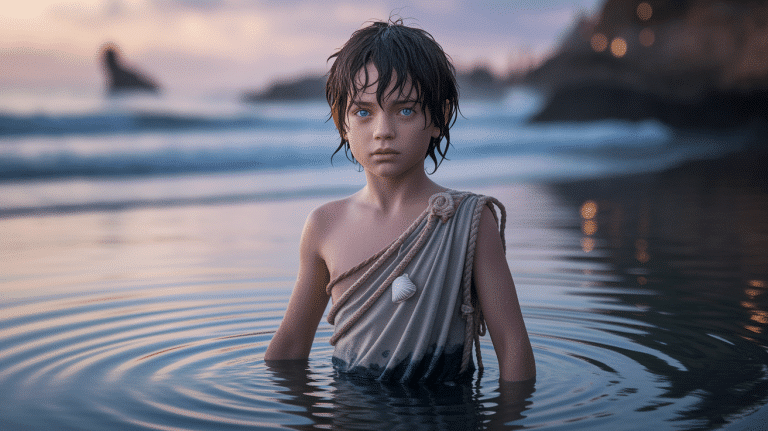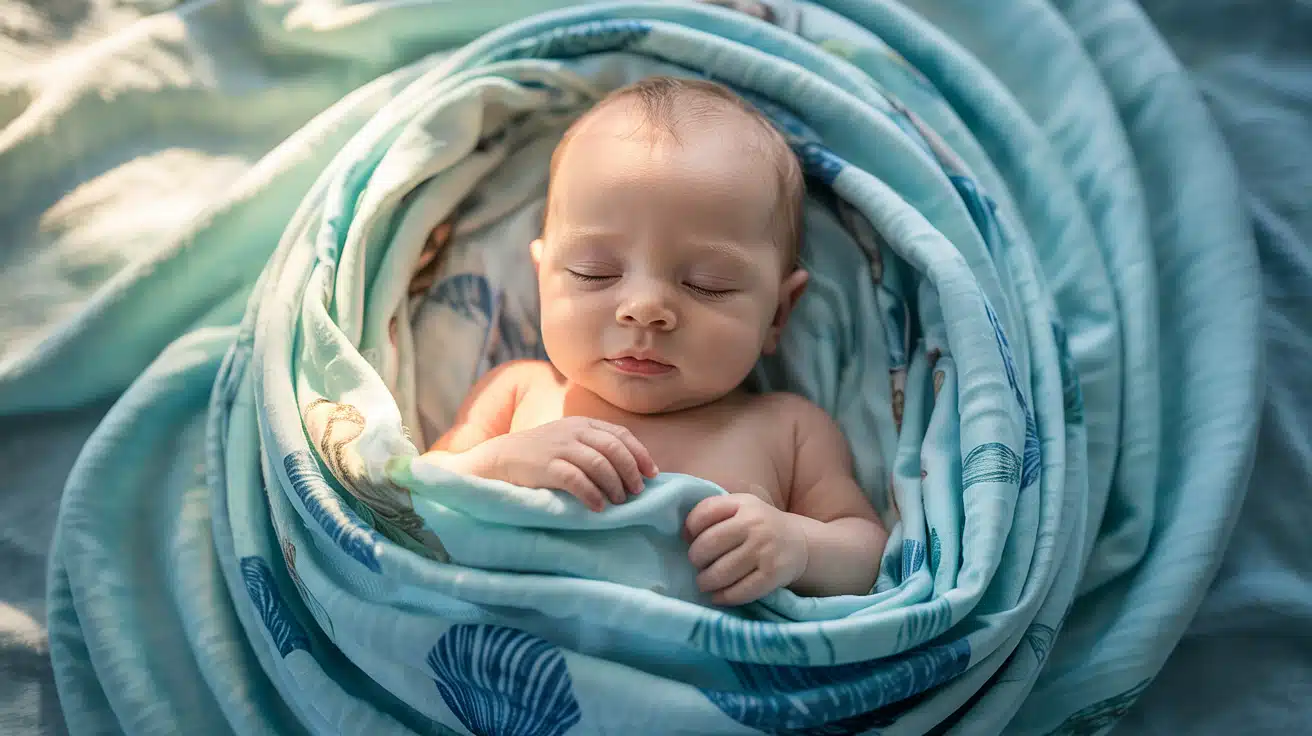Water has always been a symbol of life, mystery, and power in myths and legends from cultures worldwide. From vast oceans to flowing rivers, water represents both calm and strength.
Many cultures have created mythological figures associated with water—gods, spirits, or sea creatures—each representing distinct aspects of this essential element.
If you’re looking for a unique and meaningful name for your child, consider drawing inspiration from water mythology.
From ocean gods to water spirits, these names carry a sense of wonder and ancient significance. A water-inspired name not only sounds appealing but also connects your child to an element that’s both nurturing and powerful.
In this list, we’ve collected 250 mythical water names for boys, each with its own rich story and meaning.
Why Choose a Mythical Water Name for Your Baby Boy?
Choosing a mythical water name for your baby boy can be a meaningful and powerful decision. Here are some reasons why these names are worth considering:
- Connection to Nature’s Power: By choosing a water-inspired name, you connect your child to this vital force of nature.
- Rich Cultural Significance names carry deep symbolism and reflect powerful traits such as wisdom, resilience, and courage.
- Versatility and Meaning: Water names come in many forms, from gentle river spirits to mighty ocean gods, allowing you to choose a name that reflects your child’s future potential and personality.
- Timeless and Unique: Water tends to be unique, offering your child a name that stands out with a deep, meaningful origin.
Ocean-Inspired Names for Boys
1. Poseidon
-
Pronunciation: [puh-SAI-dun]
-
Origin: Greek
-
Meaning: God of the sea in Greek mythology.
2. Nereus
-
Pronunciation: [NEE-ree-us]
-
Origin: Greek
-
Meaning: The god of the sea, father of the Nereids.
3. Triton
-
Pronunciation: [TRY-ton]
-
Origin: Greek
-
Meaning: A god of the sea, son of Poseidon and Amphitrite.
4. Neptune
-
Pronunciation: [NEP-toon]
-
Origin: Roman
-
Meaning: The Roman counterpart of Poseidon, god of the sea.
5. Oceanus
-
Pronunciation: [oh-SHAY-an-us]
-
Origin: Greek
-
Meaning: A Titan god of the ocean, representing the ocean that encircles the world.
6. Caspian
-
Pronunciation: [KAS-pee-an]
-
Origin: Persian
-
Meaning: Referring to the Caspian Sea, the world’s largest inland body of water.
7. Atlantis
-
Pronunciation: [at-LAN-tis]
-
Origin: Greek
-
Meaning: A mythical island kingdom, said to have been swallowed by the ocean.
8. Marinus
-
Pronunciation: [ma-RIN-us]
-
Origin: Latin
-
Meaning: Derived from the Latin word for “of the sea.”
9. Marlin
-
Pronunciation: [MAR-lin]
-
Origin: English
-
Meaning: Named after the marlin fish, a symbol of strength and speed in the ocean.
10. Cordoba
-
Pronunciation: [kor-DOH-bah]
-
Origin: Spanish
-
Meaning: Named after the coastal city in Argentina, symbolizing water and trade routes.
11. Atlantis
-
Pronunciation: [at-LAN-tis]
-
Origin: Greek
-
Meaning: The legendary lost city, said to be submerged beneath the ocean.
12. Marlin
-
Pronunciation: [MAR-lin]
-
Origin: English
-
Meaning: Named after the marlin fish, known for its speed and strength in the ocean.
13. Nautilus
-
Pronunciation: [NAW-tuh-lus]
-
Origin: Greek
-
Meaning: Refers to the spiral-shelled marine mollusk, often a symbol of the ocean’s mysteries.
14. Reef
-
Pronunciation: [REEF]
-
Origin: English
-
Meaning: Referring to a coral reef, representing vibrant underwater ecosystems.
15. Castor
-
Pronunciation: [KAS-tor]
-
Origin: Greek
-
Meaning: From Greek mythology, Castor was one of the twin brothers of the constellation Gemini, known for navigating the seas.
16. Maris
-
Pronunciation: [MAH-ris]
-
Origin: Latin
-
Meaning: Derived from the Latin word for “sea,” symbolizing the beauty of the ocean.
17. Nalu
-
Pronunciation: [NAH-loo]
-
Origin: Hawaiian
-
Meaning: Meaning “wave” in Hawaiian, representing the rhythm of the ocean.
18. Boreas
-
Pronunciation: [BOH-ree-us]
-
Origin: Greek
-
Meaning: The Greek god of the north wind, often associated with the freezing winds of the ocean.
19. Sirena
-
Pronunciation: [see-REH-nah]
-
Origin: Spanish
-
Meaning: Derived from “siren,” the mythical sea creatures who lure sailors with their singing.
20. Marisca
-
Pronunciation: [MAH-ris-ka]
-
Origin: Spanish
-
Meaning: Meaning “of the sea” in Spanish, reflecting the power and mystery of the ocean.
21. Aquilo
-
Pronunciation: [AH-kwil-oh]
-
Origin: Latin
-
Meaning: Referring to the North Wind, known in mythology for its connection to water and storms.
River-Inspired Names
22. Nile
-
Pronunciation: [NYL]
-
Origin: Egyptian
-
Meaning: Named after the famous river, symbolizing life-giving waters.
23. Jordan
-
Pronunciation: [JOR-dun]
-
Origin: Hebrew
-
Meaning: Refers to the Jordan River, a historically significant body of water.
24. Thames
-
Pronunciation: [TEMZ]
-
Origin: English
-
Meaning: Named after the famous English river.
25. Rio
-
Pronunciation: [REE-oh]
-
Origin: Spanish/Portuguese
-
Meaning: Referring to “river” in Spanish and Portuguese, a common term for rivers.
26. Ganges
-
Pronunciation: [GAN-jeez]
-
Origin: Sanskrit
-
Meaning: Named after the sacred river in India.
27. Rhone
-
Pronunciation: [ROHN]
-
Origin: French
-
Meaning: Named after the Rhône River in France, known for its historical importance.
28. Seine
-
Pronunciation: [SEN]
-
Origin: French
-
Meaning: Named after the Seine River in Paris, famous for its cultural significance.
29. Amazon
-
Pronunciation: [AM-uh-zon]
-
Origin: Greek
-
Meaning: Referring to the Amazon River, the largest river by discharge in the world.
30. Tigris
-
Pronunciation: [TIE-gris]
-
Origin: Greek
-
Meaning: Named after the Tigris River, flowing through the Middle East.
31. Danube
-
Pronunciation: [DAN-yube]
-
Origin: Latin
-
Meaning: A river name that runs through Central and Eastern Europe.
32. Indus
-
Pronunciation: [IN-dus]
-
Origin: Latin
-
Meaning: Named after the Indus River, one of the longest rivers in the world.
33. Rhine
-
Pronunciation: [RYNE]
-
Origin: Germanic
-
Meaning: Referring to the famous Rhine River in Europe, known for its cultural and historical significance.
34. Yangtze
-
Pronunciation: [YANG-tzee]
-
Origin: Chinese
-
Meaning: Named after the Yangtze River, the longest river in China.
35. Danube
-
Pronunciation: [DAN-yube]
-
Origin: Latin
-
Meaning: A major river in Europe that flows through several countries, representing power and connection.
36. Volga
-
Pronunciation: [VOL-gah]
-
Origin: Russian
-
Meaning: Named after the Volga River in Russia, the longest river in Europe.
Mythical Water Spirits Inspired Names.
37. Undine
-
Pronunciation: [UN-deen]
-
Origin: Latin
-
Meaning: A water spirit or elemental in European folklore.
38. Kelpie
-
Pronunciation: [KEL-pee]
-
Origin: Scottish
-
Meaning: A water spirit, typically depicted as a horse, that resides in lochs.
39. Selkie
-
Pronunciation: [SEL-kee]
-
Origin: Scottish/Icelandic
-
Meaning: A seal spirit from Scottish and Icelandic mythology.
40. Naiad
-
Pronunciation: [NY-ad]
-
Origin: Greek
-
Meaning: A type of water nymph in Greek mythology, usually associated with freshwater.
41. Leviathan
-
Pronunciation: [leh-VYE-uh-than]
-
Origin: Hebrew
-
Meaning: A sea monster mentioned in the Bible, symbolizing chaos and power in the waters.
42. Mazu
-
Pronunciation: [MAH-zoo]
-
Origin: Chinese
-
Meaning: The Chinese goddess of the sea and protector of fishermen.
43. Davy
-
Pronunciation: [DAY-vee]
-
Origin: English
-
Meaning: Refers to Davy Jones, the mythical sea god who commands the locker of the dead sailors.
44. Hippocampus
-
Pronunciation: [hip-oh-KAM-pus]
-
Origin: Greek
-
Meaning: A half-horse, half-fish creature from Greek mythology, associated with Poseidon.
45. Charon
-
Pronunciation: [KAIR-ohn]
-
Origin: Greek
-
Meaning: The ferryman of the underworld, guiding souls across the river Styx.
46. Lir
-
Pronunciation: [LEER]
-
Origin: Irish
-
Meaning: The god of the sea in Irish mythology, associated with the ocean’s power.
47. Vodyanoy
-
Pronunciation: [VOD-ya-noy]
-
Origin: Slavic
-
Meaning: A water spirit from Slavic folklore, often depicted as an old man with moss growing on him.
48. Suyai
-
Pronunciation: [SUH-yai]
-
Origin: Aymara
-
Meaning: An ancient water goddess in Andean mythology, symbolizing fertility and the life-giving power of water.
49. Nokken
-
Pronunciation: [NAH-ken]
-
Origin: Scandinavian
-
Meaning: A water spirit that lures people into the water to drown them, known in Nordic folklore.
50. Iara
-
Pronunciation: [ee-AH-rah]
-
Origin: Brazilian
-
Meaning: A water nymph from Brazilian folklore, often described as a beautiful woman who lives in rivers.
51. Lir
-
Pronunciation: [LEER]
-
Origin: Irish
-
Meaning: The god of the sea in Irish mythology, father to the legendary children of Lir.
Lake-Inspired Names
52. Tahoe
-
Pronunciation: [TAH-hoh]
-
Origin: Native American
-
Meaning: Referring to Lake Tahoe, the second-deepest lake in the United States.
53. Michigan
-
Pronunciation: [MISH-i-guhn]
-
Origin: Native American
-
Meaning: Named after Lake Michigan, one of the Great Lakes.
54. Erie
-
Pronunciation: [EE-ree]
-
Origin: Native American
-
Meaning: Named after Lake Erie, one of the five Great Lakes in North America.
55. Ladoga
-
Pronunciation: [LAD-oh-guh]
-
Origin: Russian
-
Meaning: Named after Lake Ladoga, the largest lake in Europe.
56. Constance
-
Pronunciation: [KON-stuhns]
-
Origin: Latin
-
Meaning: Named after Lake Constance, a large lake on the border between Germany, Austria, and Switzerland.
57. Ontario
-
Pronunciation: [on-TAIR-ee-oh]
-
Origin: Iroquoian
-
Meaning: Named after Lake Ontario, one of the Great Lakes in North America.
58. Geneva
-
Pronunciation: [jeh-NEE-vuh]
-
Origin: Latin
-
Meaning: Named after Lake Geneva, a large lake in Switzerland and France.
59. Superior
-
Pronunciation: [soo-PEER-yor]
-
Origin: English
-
Meaning: Referring to Lake Superior, the largest of the Great Lakes in North America.
60. Champlain
-
Pronunciation: [sham-PLANE]
-
Origin: French
-
Meaning: Named after Lake Champlain, which lies between the US and Canada.
61. Vostok
-
Pronunciation: [VOH-stock]
-
Origin: Russian
-
Meaning: Named after Lake Vostok, one of the largest subglacial lakes in Antarctica.
62. Garda
-
Pronunciation: [GAR-duh]
-
Origin: Irish
-
Meaning: Named after the famous Lake Garda in Italy, symbolizing peace and tranquility.
63. Michigan
-
Pronunciation: [MISH-i-guhn]
-
Origin: Native American
-
Meaning: Referring to the Great Lake, Michigan, often associated with strength and vastness.
64. Tahoe
-
Pronunciation: [TAH-hoh]
-
Origin: Native American
-
Meaning: A lake in the Sierra Nevada mountains, known for its clarity and scenic beauty.
65. Vostok
-
Pronunciation: [VOH-stock]
-
Origin: Russian
-
Meaning: Named after Lake Vostok, a subglacial lake in Antarctica, symbolizing mystery.
66. Balaton
-
Pronunciation: [BAL-ah-ton]
-
Origin: Hungarian
-
Meaning: Named after Lake Balaton in Hungary, the largest freshwater lake in Central Europe.
67. Geneva
-
Pronunciation: [jeh-NEE-vuh]
-
Origin: Latin
-
Meaning: Referring to Lake Geneva, a large and beautiful lake on the border of Switzerland and France.
68. Como
-
Pronunciation: [KOH-moh]
-
Origin: Italian
-
Meaning: Named after Lake Como in Italy, known for its stunning beauty and romantic atmosphere.
69. Titicaca
-
Pronunciation: [TIT-ee-KAH-kah]
-
Origin: Quechua
-
Meaning: A large lake in the Andes, considered sacred by the indigenous people of Peru and Bolivia.
70. Balaton
-
Pronunciation: [BAL-ah-ton]
-
Origin: Hungarian
-
Meaning: Referring to Lake Balaton in Hungary, the largest freshwater lake in Central Europe.
71. Caspian
-
Pronunciation: [KAS-pee-an]
-
Origin: Persian
-
Meaning: Named after the Caspian Sea, the world’s largest inland body of water.
Water Deities from Various Mythologies
72. Vishnu
-
Pronunciation: [VISH-noo]
-
Origin: Hindu
-
Meaning: A principal deity in Hinduism, often depicted as resting on the ocean or associated with water.
73. Sobek
-
Pronunciation: [SOH-bek]
-
Origin: Egyptian
-
Meaning: The ancient Egyptian god of the Nile, depicted as a crocodile or with a crocodile head.
74. Tlaloc
-
Pronunciation: [TLAH-lock]
-
Origin: Aztec
-
Meaning: The Aztec god of rain and water, associated with fertility and agriculture.
75. Ao Guang
-
Pronunciation: [OW Gwahng]
-
Origin: Chinese
-
Meaning: The Dragon King of the East Sea in Chinese mythology, ruler of the oceans.
76. Chalchiuhtlicue
-
Pronunciation: [CHAL-chee-oot-lee-kway]
-
Origin: Aztec
-
Meaning: The Aztec goddess of lakes, rivers, and water.
77. Poseidonis
-
Pronunciation: [po-SYE-don-iss]
-
Origin: Greek
-
Meaning: A variant of Poseidon, referring to the sea god’s power over all waters.
78. Yemaya
-
Pronunciation: [yeh-MAH-yah]
-
Origin: African (Yoruba)
-
Meaning: The Yoruba goddess of the sea, oceans, and motherhood.
79. Varuna
-
Pronunciation: [vah-ROO-nah]
-
Origin: Sanskrit
-
Meaning: The Hindu god of the waters, the sky, and cosmic order.
80. Njord
-
Pronunciation: [NYORD]
-
Origin: Norse
-
Meaning: The Norse god of the sea, wind, and wealth.
81. Thetis
-
Pronunciation: [THEE-tiss]
-
Origin: Greek
-
Meaning: A sea nymph in Greek mythology, the mother of Achilles.
82. Aphrodite
-
Pronunciation: [af-roh-DYE-tee]
-
Origin: Greek
-
Meaning: Greek goddess of love and beauty, who emerged from the sea foam.
83. Brizo
-
Pronunciation: [BRY-zoh]
-
Origin: Greek
-
Meaning: A Greek sea goddess who protected sailors and fishermen.
84. Apollonia
-
Pronunciation: [a-PAW-loh-nee-ah]
-
Origin: Greek
-
Meaning: A goddess associated with the sea, often linked with the island of Delos.
85. Pelagos
-
Pronunciation: [PEL-a-gos]
-
Origin: Greek
-
Meaning: A name derived from the Greek word for “sea,” symbolizing vast waters.
86. Salacia
-
Pronunciation: [sa-LAY-shuh]
-
Origin: Roman
-
Meaning: The Roman goddess of saltwater, wife of Neptune, and queen of the seas.
Sea Creature-Inspired Names
87. Kraken
-
Pronunciation: [KRAH-ken]
-
Origin: Scandinavian
-
Meaning: A legendary sea monster that terrorizes sailors in Scandinavian folklore.
88. Leviathan
-
Pronunciation: [leh-VYE-uh-than]
-
Origin: Hebrew
-
Meaning: A biblical sea monster, often used as a symbol of chaos and the ocean’s power.
89. Merman
-
Pronunciation: [MUR-man]
-
Origin: European folklore
-
Meaning: A mythical sea creature, similar to a mermaid but male.
90. Siren
-
Pronunciation: [SY-ren]
-
Origin: Greek
-
Meaning: A dangerous sea creature that lures sailors to their doom with enchanting songs.
91. Thalassa
-
Pronunciation: [thuh-LAH-suh]
-
Origin: Greek
-
Meaning: The personification of the sea in Greek mythology.
92. Kraken
-
Pronunciation: [KRAH-ken]
-
Origin: Scandinavian
-
Meaning: A legendary sea monster that terrorizes sailors in Scandinavian folklore.
93. Leviathan
-
Pronunciation: [leh-VYE-uh-than]
-
Origin: Hebrew
-
Meaning: A biblical sea monster, often used as a symbol of chaos and the ocean’s power.
94. Merman
-
Pronunciation: [MUR-man]
-
Origin: European folklore
-
Meaning: A mythical sea creature, similar to a mermaid but male.
95. Siren
-
Pronunciation: [SY-ren]
-
Origin: Greek
-
Meaning: A dangerous sea creature that lures sailors to their doom with enchanting songs.
96. Thalassa
-
Pronunciation: [thuh-LAH-suh]
-
Origin: Greek
-
Meaning: The personification of the sea in Greek mythology.
97. Coral
-
Pronunciation: [KOR-uhl]
-
Origin: English
-
Meaning: Referring to the colorful marine organisms found in the ocean.
98. Shark
-
Pronunciation: [SHARK]
-
Origin: English
-
Meaning: Referring to the predatory fish, symbolizing power and agility in the water.
99. Orca
-
Pronunciation: [OR-kuh]
-
Origin: Latin
-
Meaning: Referring to the killer whale, known for its intelligence and strength in the ocean.
100. Mako
-
Pronunciation: [MAY-ko]
-
Origin: Maori
-
Meaning: A species of shark, known for being fast and formidable in the ocean.
101. Stingray
-
Pronunciation: [STING-ray]
-
Origin: English
-
Meaning: Referring to the ray fish with a barbed tail, known for its smooth movement in the water.
102. Congo
-
Pronunciation: [KON-go]
-
Origin: African
-
Meaning: Named after the Congo River in Africa, one of the largest rivers on the continent.
103. Mississippi
-
Pronunciation: [mi-SISS-uh-pee]
-
Origin: Native American
-
Meaning: Named after the Mississippi River, which flows through the heart of the United States.
104. Amazon
-
Pronunciation: [AM-uh-zon]
-
Origin: Greek
-
Meaning: The largest river by discharge in the world, flowing through the Amazon Rainforest.
105. Zambezi
-
Pronunciation: [zam-BEE-zee]
-
Origin: Bantu
-
Meaning: Named after the Zambezi River, which flows through several African countries.
106. Mekong
-
Pronunciation: [ME-kong]
-
Origin: Southeast Asian
-
Meaning: A major river in Southeast Asia that runs through countries like Cambodia and Vietnam.
107. Dolphin
-
Pronunciation: [DOL-fin]
-
Origin: Greek
-
Meaning: Referring to the intelligent and social marine mammal, known for its playfulness in the water.
108. Narwhal
-
Pronunciation: [NAHR-wahl]
-
Origin: Norse
-
Meaning: A species of whale known for its long, spiral tusks, often called the unicorn of the sea.
109. Octavius
-
Pronunciation: [ok-TAY-vee-us]
-
Origin: Latin
-
Meaning: Derived from “octopus,” symbolizing intelligence and adaptability in the water.
110. Manatee
-
Pronunciation: [MAN-uh-tee]
-
Origin: Spanish
-
Meaning: A slow-moving sea mammal, often associated with peaceful and calm waters.
111. Beluga
-
Pronunciation: [buh-LOO-gah]
-
Origin: Russian
-
Meaning: A species of whale known for its white color and playful nature.
112. Seahorse
-
Pronunciation: [SEE-horse]
-
Origin: English
-
Meaning: Referring to the small marine creature, symbolizing agility and grace in the water.
113. Angler
-
Pronunciation: [ANG-lur]
-
Origin: English
-
Meaning: Referring to the anglerfish, known for its glowing lure that attracts prey from the depths.
114. Narwhal
-
Pronunciation: [NAHR-wahl]
-
Origin: Norse
-
Meaning: A whale with a spiral tusk, symbolizing mystery and the unknown depths of the ocean.
115. Stingray
-
Pronunciation: [STING-ray]
-
Origin: English
-
Meaning: A flat, cartilaginous fish that glides along the sea floor, symbolizing smooth, silent movement.
116. Manatee
-
Pronunciation: [MAN-uh-tee]
-
Origin: Spanish
-
Meaning: A large, gentle aquatic mammal, often called a sea cow, symbolizing peacefulness and gentleness.
Water Element Names
117. Aqua
-
Pronunciation: [AH-kwuh]
-
Origin: Latin
-
Meaning: Derived from the Latin word for water, symbolizing the element of water.
118. Hydros
-
Pronunciation: [HY-drohs]
-
Origin: Greek
-
Meaning: Referring to the Greek word for water, associated with the power of the water element.
119. Zephyros
-
Pronunciation: [ZEF-i-rohs]
-
Origin: Greek
-
Meaning: The Greek god of the west wind, symbolizing the connection between air and water.
120. Aqualon
-
Pronunciation: [AH-kwuh-lon]
-
Origin: Fictional
-
Meaning: A creative name inspired by water and strength, combining “aqua” and “strong.”
121. Oceanic
-
Pronunciation: [oh-SHEN-ik]
-
Origin: English
-
Meaning: Referring to the vastness and depth of the ocean, symbolizing endless water.
122. Aqua
-
Pronunciation: [AH-kwuh]
-
Origin: Latin
-
Meaning: Derived from the Latin word for water, symbolizing the element of water.
123. Hydros
-
Pronunciation: [HY-drohs]
-
Origin: Greek
-
Meaning: Referring to the Greek word for water, associated with the power of the water element.
124. Zephyros
-
Pronunciation: [ZEF-i-rohs]
-
Origin: Greek
-
Meaning: The Greek god of the west wind, symbolizing the connection between air and water.
125. Aqualon
-
Pronunciation: [AH-kwuh-lon]
-
Origin: Fictional
-
Meaning: A creative name inspired by water and strength, combining “aqua” and “strong.”
126. Oceanic
-
Pronunciation: [oh-SHEN-ik]
-
Origin: English
-
Meaning: Referring to the vastness and depth of the ocean, symbolizing endless water.
127. Cascade
-
Pronunciation: [KAS-kade]
-
Origin: Latin
-
Meaning: Refers to a waterfall or series of small waterfalls, symbolizing the dynamic flow of water.
128. Dew
-
Pronunciation: [DOO]
-
Origin: English
-
Meaning: Referring to the tiny drops of water that collect on surfaces during the night.
129. Mist
-
Pronunciation: [MIST]
-
Origin: English
-
Meaning: Referring to the fine spray of water droplets in the air, often associated with calmness and purity.
130. Wetland
-
Pronunciation: [WET-land]
-
Origin: English
-
Meaning: A type of land saturated with water, symbolizing the connection between land and water ecosystems.
131. Aquafer
-
Pronunciation: [AH-kwuh-fer]
-
Origin: Latin
-
Meaning: A term used for underground water sources, representing life-giving water from the earth.
Mythological Water Creature-Based Names
132. Charybdis
-
Pronunciation: [ka-RIB-dis]
-
Origin: Greek
-
Meaning: A sea monster in Greek mythology, created by Poseidon to trap ships in a deadly whirlpool.
133. Scylla
-
Pronunciation: [SIL-uh]
-
Origin: Greek
-
Meaning: A monstrous sea creature that, together with Charybdis, formed a dangerous passage for sailors.
134. kraaken
- Pronunciation: [KRAH-ken]
-
Origin: Scandinavian
-
Meaning: A legendary sea monster that terrorizes sailors in Scandinavian folklore.
135. Charybdis
-
Pronunciation: [ka-RIB-dis]
-
Origin: Greek
-
Meaning: A massive whirlpool that swallows ships and sailors.
136. Nymph
-
Pronunciation: [NIMP]
-
Origin: Greek
-
Meaning: A spirit of nature, often associated with water, such as river or lake nymphs.
137. Charybdis
-
Pronunciation: [ka-RIB-dis]
-
Origin: Greek
-
Meaning: A sea monster in Greek mythology, created by Poseidon to trap ships in a deadly whirlpool.
138. Scylla
-
Pronunciation: [SIL-uh]
-
Origin: Greek
-
Meaning: A monstrous sea creature that, together with Charybdis, formed a dangerous passage for sailors.
139. Kraken
-
Pronunciation: [KRAH-ken]
-
Origin: Scandinavian
-
Meaning: A legendary sea monster that terrorizes sailors in Scandinavian folklore.
140. Charybdis
-
Pronunciation: [ka-RIB-dis]
-
Origin: Greek
-
Meaning: A massive whirlpool that swallows ships and sailors.
141. Nymph
-
Pronunciation: [NIMP]
-
Origin: Greek
-
Meaning: A spirit of nature, often associated with water, such as river or lake nymphs.
142. Hydra
-
Pronunciation: [HY-drah]
-
Origin: Greek
-
Meaning: A serpent-like creature from Greek mythology, known for growing two heads for every one that was cut off.
143. Jörmungandr
-
Pronunciation: [YOR-mung-and-er]
-
Origin: Norse
-
Meaning: The Midgard Serpent, a giant sea serpent that encircles the world in Norse mythology.
144. Naiad
-
Pronunciation: [NAY-ad]
-
Origin: Greek
-
Meaning: A type of water nymph in Greek mythology, associated with freshwater bodies like rivers and streams.
145. Kraken
-
Pronunciation: [KRAH-ken]
-
Origin: Scandinavian
-
Meaning: A legendary sea monster from Scandinavian folklore, feared by sailors for its massive size.
146. Charybdis
-
Pronunciation: [ka-RIB-dis]
-
Origin: Greek
-
Meaning: A sea monster from Greek mythology, creating a deadly whirlpool to trap sailors.
147. Plesiosaurus
-
Pronunciation: [PLEE-see-oh-SORE-us]
-
Origin: Greek
-
Meaning: A long-necked marine reptile from prehistoric times, associated with legends of the Loch Ness Monster.
148. Leviathan
-
Pronunciation: [leh-VYE-uh-than]
-
Origin: Hebrew
-
Meaning: A sea serpent from biblical texts, often depicted as an ancient creature of immense size.
149. Cetus
-
Pronunciation: [SEE-tus]
-
Origin: Greek
-
Meaning: A sea monster from Greek mythology, often depicted as a giant fish or whale.
150. Basilisk
-
Pronunciation: [BAS-uh-lisk]
-
Origin: Greek
-
Meaning: A serpent-like creature, often associated with water, capable of turning people to stone with its gaze.
151. Nereid
-
Pronunciation: [NEH-ree-id]
-
Origin: Greek
-
Meaning: Water nymphs in Greek mythology, often depicted as beautiful young women who inhabit the sea.
152. Hydros
-
Pronunciation: [HY-drohs]
-
Origin: Greek
-
Meaning: A water spirit from Greek mythology, often associated with the essence of water.
153. Yemaya
-
Pronunciation: [yeh-MAH-yah]
-
Origin: African (Yoruba)
-
Meaning: The goddess of the sea in Yoruba religion, often invoked for fertility and prosperity.
154. Asrai
-
Pronunciation: [ASS-ray]
-
Origin: English
-
Meaning: A water spirit or fairy in English folklore, said to live in rivers and lakes.
155. Naiad
-
Pronunciation: [NY-ad]
-
Origin: Greek
-
Meaning: Water nymphs in Greek mythology, usually associated with fresh water like rivers and lakes.
156. Lorelei
-
Pronunciation: [LORE-uh-lee]
-
Origin: German
-
Meaning: A siren from German folklore who lured sailors to their doom from the rocks along the Rhine River.
Coastal and Beach-Inspired Names
157. Reef
-
Pronunciation: [REEF]
-
Origin: English
-
Meaning: Referring to the coral reefs found in tropical seas, symbolizing marine life.
158. Cove
-
Pronunciation: [KOHV]
-
Origin: English
-
Meaning: A small, sheltered bay, often a peaceful and calm area along the coast.
159. Dune
-
Pronunciation: [DOON]
-
Origin: English
-
Meaning: Referring to the sandy hills often found along the coastline.
160. Tidal
-
Pronunciation: [TIDE-uhl]
-
Origin: English
-
Meaning: Relating to the tides of the ocean, symbolizing the rise and fall of water.
161. Bay
-
Pronunciation: [BAY]
-
Origin: English
-
Meaning: A body of water partially enclosed by land, representing calm waters by the shore.
162. Reef
-
Pronunciation: [REEF]
-
Origin: English
-
Meaning: Referring to the coral reefs found in tropical seas, symbolizing marine life.
163. Cove
-
Pronunciation: [KOHV]
-
Origin: English
-
Meaning: A small, sheltered bay, often a peaceful and calm area along the coast.
164. Dune
-
Pronunciation: [DOON]
-
Origin: English
-
Meaning: Referring to the sandy hills often found along the coastline.
165. Tidal
-
Pronunciation: [TIDE-uhl]
-
Origin: English
-
Meaning: Relating to the tides of the ocean, symbolizing the rise and fall of water.
166. Bay
-
Pronunciation: [BAY]
-
Origin: English
-
Meaning: A body of water partially enclosed by land, representing calm waters by the shore.
167. Shore
-
Pronunciation: [SHOR]
-
Origin: English
-
Meaning: Referring to the land along the edge of a body of water, symbolizing the connection between water and land.
168. Wave
-
Pronunciation: [WAYV]
-
Origin: English
-
Meaning: Referring to the motion of water, especially the rise and fall of waves in the ocean.
169. Reef
-
Pronunciation: [REEF]
-
Origin: English
-
Meaning: Referring to a submerged ridge of rock or coral, often teeming with marine life.
170. Sand
-
Pronunciation: [SAND]
-
Origin: English
-
Meaning: Referring to the small particles of rock found on beaches, symbolizing the shore and coastlines.
171. Breeze
-
Pronunciation: [BREEZ]
-
Origin: English
-
Meaning: Referring to a gentle wind that often comes from over the water, symbolizing lightness and air.
172. Coast
-
Pronunciation: [KOHST]
-
Origin: English
-
Meaning: Referring to the land next to a body of water, symbolizing the meeting point of land and sea.
173. Seashore
-
Pronunciation: [SEE-shore]
-
Origin: English
-
Meaning: The area where the ocean meets the land, representing tranquility and the cycle of tides.
174. Sandbar
-
Pronunciation: [SAND-bar]
-
Origin: English
-
Meaning: A submerged or partially submerged ridge of sand in shallow water, often formed by the movement of waves.
175. Current
-
Pronunciation: [KUR-uhnt]
-
Origin: English
-
Meaning: Referring to a flow of water, especially in oceans or rivers, symbolizing constant movement.
176. Salt
-
Pronunciation: [SAWLT]
-
Origin: English
-
Meaning: Referring to saltwater, often associated with the ocean and purity.
Water Creatures from Global Mythology
177. Amabie
-
Pronunciation: [AH-mah-bee-eh]
-
Origin: Japanese
-
Meaning: A mythical sea creature from Japanese folklore, believed to bring good health.
178. Taniwha
-
Pronunciation: [TAH-nee-wah]
-
Origin: Maori
-
Meaning: A supernatural creature in Maori mythology, often associated with rivers or seas.
179. Quetzalcoatl
-
Pronunciation: [KET-zahl-koh-ahl]
-
Origin: Aztec
-
Meaning: The feathered serpent god, sometimes associated with water and the wind.
180. Makara
-
Pronunciation: [MAH-kah-rah]
-
Origin: Hindu
-
Meaning: A mythical sea creature, often depicted as a crocodile or fish, symbolizing the balance of water and land.
181. Bunyip
-
Pronunciation: [BUN-yip]
-
Origin: Australian Aboriginal
-
Meaning: A mythical creature said to inhabit swamps, creeks, and waterholes in Australian folklore.
182. Amabie
-
Pronunciation: [AH-mah-bee-eh]
-
Origin: Japanese
-
Meaning: A mythical sea creature from Japanese folklore, believed to bring good health.
183. Taniwha
-
Pronunciation: [TAH-nee-wah]
-
Origin: Maori
-
Meaning: A supernatural creature in Maori mythology, often associated with rivers or seas.
184. Quetzalcoatl
-
Pronunciation: [KET-zahl-koh-ahl]
-
Origin: Aztec
-
Meaning: The feathered serpent god, sometimes associated with water and the wind.
185. Makara
-
Pronunciation: [MAH-kah-rah]
-
Origin: Hindu
-
Meaning: A mythical sea creature, often depicted as a crocodile or fish, symbolizing the balance of water and land.
186. Bunyip
-
Pronunciation: [BUN-yip]
-
Origin: Australian Aboriginal
-
Meaning: A mythical creature said to inhabit swamps, creeks, and waterholes in Australian folklore.
187. Amikuk
-
Pronunciation: [AH-mee-kook]
-
Origin: Inuit
-
Meaning: A mythical creature from Inuit mythology, believed to be a spirit of the ocean.
188. Kawa-no-kami
-
Pronunciation: [KA-wah-noh-KAH-mee]
-
Origin: Japanese
-
Meaning: A water god in Japanese mythology, associated with rivers and streams.
189. Morrigan
-
Pronunciation: [MOHR-ih-gan]
-
Origin: Irish
-
Meaning: A goddess of war and fate, often associated with water in Irish mythology.
190. Tlacochauqui
-
Pronunciation: [TLAH-koh-CHAU-kee]
-
Origin: Aztec
-
Meaning: An Aztec water goddess, symbolizing fresh water and the flow of life.
191. Wauke
-
Pronunciation: [WAH-kee]
-
Origin: Native American
-
Meaning: A water spirit in Native American mythology, often associated with rain and rivers
192. Tlaloc
-
Pronunciation: [TLAH-lock]
-
Origin: Aztec
-
Meaning: The Aztec god of rain, water, and fertility, associated with thunderstorms and agriculture.
193. Uroko
-
Pronunciation: [OO-roh-koh]
-
Origin: Japanese
-
Meaning: A water deity from Japanese folklore, often linked with rivers and rainfall.
194. Bunyip
-
Pronunciation: [BUN-yip]
-
Origin: Australian Aboriginal
-
Meaning: A mythical creature said to live in swamps, creeks, and waterholes, often used to scare children.
195. Yemaya
-
Pronunciation: [yeh-MAH-yah]
-
Origin: African
-
Meaning: An ocean goddess in the Yoruba religion, associated with fertility and motherhood.
196. Taniwha
-
Pronunciation: [TAH-nee-wah]
-
Origin: Maori
-
Meaning: A mythical creature in Māori mythology, often associated with rivers, lakes, and the sea.
197. Nuckelavee
-
Pronunciation: [NUK-uh-LAV-ee]
-
Origin: Scottish
-
Meaning: A terrifying water demon from Orcadian mythology, with a horse-like body and no skin.
198. Makara
-
Pronunciation: [MAH-kah-rah]
-
Origin: Hindu
-
Meaning: A sea creature in Hindu mythology, often depicted as a crocodile or fish.
199. Taniwha
-
Pronunciation: [TAH-nee-wah]
-
Origin: Maori
-
Meaning: A mythical sea creature from Maori mythology, often described as a giant water creature or dragon.
200. Oannes
-
Pronunciation: [OH-an-ess]
-
Origin: Babylonian
-
Meaning: A fish-man who taught humanity the arts of civilization in ancient Babylonian myths.
201. Ondine
-
Pronunciation: [ON-deen]
-
Origin: Latin
-
Meaning: A water nymph in European folklore, associated with lakes and rivers.
Water-Related Phenomena-Based Names
202. Whirlpool
- Pronunciation: [WURL-pool]
-
Origin: English
-
Meaning: A swirling body of water, often created by opposing currents, symbolizing force and mystery in the sea.
203. Delta
-
Pronunciation: [DEL-tuh]
-
Origin: Greek
-
Meaning: Referring to the landform at the mouth of a river, where it meets the sea, symbolizing connection and flow.
204. Geyser
-
Pronunciation: [GY-zer]
-
Origin: Icelandic
-
Meaning: A spring that intermittently shoots out hot water and steam, symbolizing natural power.
205. Ebb
-
Pronunciation: [EB]
-
Origin: English
-
Meaning: Refers to the receding of the tide, symbolizing the ebb and flow of life and emotions.
206. Tidepool
-
Pronunciation: [TIDE-pool]
-
Origin: English
-
Meaning: Small pools of seawater left in rocks, symbolizing isolation and beauty in the ocean’s life.
207. Aurora
-
Pronunciation: [uh-ROHR-uh]
-
Origin: Latin
-
Meaning: A natural light display in polar regions, often seen over oceans, symbolizing mystery and wonder.
208. Mist
-
Pronunciation: [MIST]
-
Origin: English
-
Meaning: A fine spray of water droplets suspended in the air, often seen by the sea or lakes, symbolizing freshness.
209. Foam
-
Pronunciation: [FOHM]
-
Origin: English
-
Meaning: The bubbly white substance formed by the agitation of water, symbolizing the beauty and force of the ocean.
210. Fountain
-
Pronunciation: [FOWN-tin]
-
Origin: Latin
-
Meaning: A spring or a decorative water feature, symbolizing life and renewal.
211. Vapor
-
Pronunciation: [VAY-per]
-
Origin: Latin
-
Meaning: Referring to water in its gaseous form, often associated with mist or steam, symbolizing transformation.
Why Mythical Water Names Create a Powerful Legacy for Boys?
-
Connection to Nature’s Strength:
Water symbolizes life, strength, adaptability, and mystery — traits that are powerful foundations for any boy’s identity. -
Timeless Stories and Legends:
Many mythical water names are rooted in ancient myths, providing your child with a name that has a rich and inspiring story behind it. -
Symbol of Courage and Exploration:
Water is ever-moving and bold, encouraging qualities like resilience, bravery, and a spirit of discovery in your son’s journey. -
Versatility Through Life Stages:
A water-inspired name grows beautifully with a child, fitting him as a playful boy, a strong teen, and a wise adult. -
A Unique and Meaningful Gift:
Beyond trends, mythical water names offer a one-of-a-kind legacy filled with imagination, depth, and timeless appeal.
Conclusion
Finding the perfect water-inspired name for your son is meaningful and special. From gods of the sea to river spirits, this list offers many options that carry both strength and beauty.
These names connect your child to the powerful symbolism of water: fluidity, life, and renewal.
When choosing a name, consider its origin, meaning, and how it sounds with your last name. Remember that your son will carry this name throughout his life, so select one that feels right for your family.
Have you found a water name that resonates with you? Bookmark this page to refer back to when making your final choice. Share your favorites in the comments below—your input might help other parents in their naming quest!




















